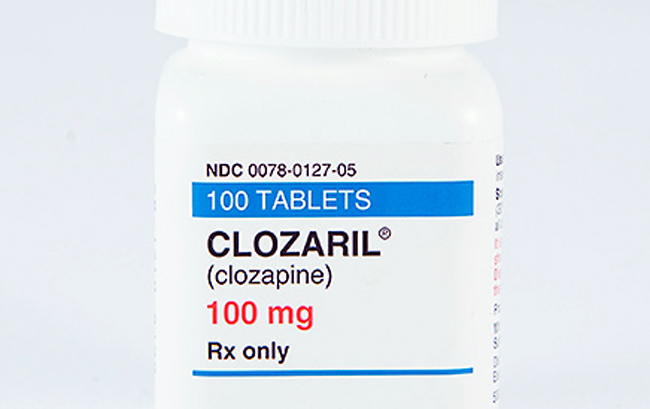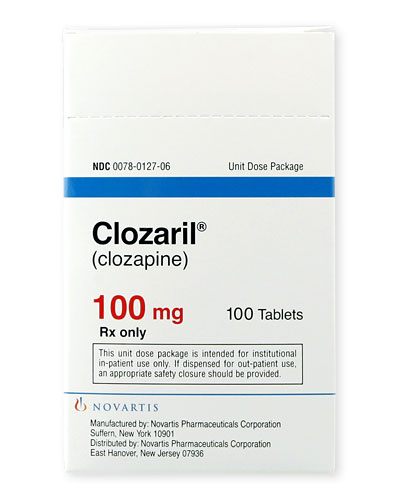Clozapine (Clozaril and FazaClo): Uses, Dosage, Side Effects

What is clozapine?
Clozapine is an antipsychotic medicine. It works by changing the actions of chemicals in the brain. Clozapine is used to treat schizophrenia after other treatments have failed. Clozapine is also FDA-approved to reduce the risk of recurrent suicidal behavior in people with schizophrenia or schizoaffective disorder.
Clozapine may also be helpful when prescribed “off-label” for patients with Parkinson’s disease who have psychosis symptoms. Psychosis symptoms may include hallucinations and delusions. “Off-label” means that it hasn’t been approved by the Food and Drug Administration for this condition. Your mental health provider should justify his or her thinking in recommending an “off-label” treatment. They should be clear about the limits of the research around that medication and if there are any other options.
Clozapine is available only from a certified pharmacy under a special program.
How Clozapine works
Clozapine is in a class of medications called atypical antipsychotics. It works by changing the activity of certain natural substances in the brain. Clozapine works primarily by blocking receptors in the brain for several neurotransmitters (chemicals that nerves use to communicate with each other) including dopamine type 4 receptors, serotonin type 2 receptors, norepinephrine receptors, acetylcholine receptors, and histamine receptors.
How does clozapine make you feel?
When you take clozapine, it helps to rebalance the levels of dopamine and serotonin in your body in order to improve thinking, mood, and behavior. Studies have shown that clozapine can decrease aggressive behaviors (including self-mutilating behaviors), ameliorate relationships, and decrease the frequency of hospitalization.
In addition, both clozapine and opioids produce orthostatic hypotension that can create a feeling of euphoria in some people according to studies.
What Is The Most Important Information I Should Know About Clozapine?
Schizophrenia requires long-term treatment. Do not stop taking clozapine, even when you feel better.
With input from you, your health care provider will assess how long you will need to take the medicine.
Missing doses of clozapine may increase your risk for a relapse in your symptoms.
Do not stop taking clozapine or change your dose without talking with your healthcare provider first.
For clozapine to work properly, it should be taken every day as ordered by your healthcare provider.
What Should I Discuss With My Healthcare Provider Before Taking Clozapine?
• Symptoms of your condition that bother you the most
• If you have thoughts of suicide or harming yourself
• Medications you have taken in the past for your condition, whether they were effective or caused any adverse effects
• If you ever had muscle stiffness, shaking, tardive dyskinesia, neuroleptic malignant syndrome, or weight gain caused by a medication
• If you experience side effects from your medications, discuss them with your provider. Some side effects may pass with time, but others may require changes in the medication.
• Any psychiatric or medical problems you have, such as heart rhythm problems, long QT syndrome, heart attacks, diabetes, high cholesterol, or seizures
• If you have a family history of diabetes or heart disease
• All other medications you are currently taking (including over the counter products, herbal and nutritional supplements) and any medication allergies you have
• Other non-medication treatments you are receiving, such as talk therapy or substance abuse treatment. Your provider can explain how these different treatments work with the medication.
• If you are pregnant, plan to become pregnant, or are breast-feeding
• If you smoke, drink alcohol, or use illegal drugs

How Should I Take Clozapine?
Clozapine is usually taken 1 or 2 times per day with or without food. Typically, patients begin at a low dose of medicine and the dose is increased slowly over several weeks. Only your healthcare provider can determine the correct dose for you.
Clozapine orally disintegrating tablets must remain in their original packaging. Open the package with clean dry hands before each dose. Do not put tablets in a pillbox if you take the orally disintegrating tablets.
Clozapine orally disintegrating tablets will dissolve in your mouth within seconds and can be swallowed with or without liquid.
Use a calendar, pillbox, alarm clock, or cell phone alert to help you remember to take your medication. You may also ask a family member or a friend to remind you or check in with you to be sure you are taking your medication.
What Happens If I Miss A Dose Of Clozapine?
If you miss a dose of clozapine, take it as soon as you remember, unless it is closer to the time of your next dose. Discuss this with your healthcare provider. Do not double your next dose or take more than what is prescribed. If you miss more than 2 days of medication, contact your prescriber because he/she may need to adjust your dose.
What Should I Avoid While Taking Clozapine?
Avoid drinking alcohol or using illegal drugs while you are taking clozapine. They may decrease the benefits (e.g. worsen your confusion) and increase adverse effects (e.g. sedation) of the medication.
What Happens If I Overdose With Clozapine?
If an overdose occurs, call your doctor or 911. You may need urgent medical care. You may also contact the poison control center at 1-800-222-1222. A specific treatment to reverse the effects of clozapine does not exist.
Can a pregnant woman take Clozapine?
If you are planning on becoming pregnant, notify your healthcare provider to best manage your medications. People living with schizophrenia who wish to become pregnant face important decisions. This is a complex decision since untreated schizophrenia has risks to the fetus, as well as the mother. It is important to discuss the risks and benefits of treatment with your doctor and caregivers.
Antipsychotic use during the third trimester of pregnancy has a risk for abnormal muscle movements (extrapyramidal symptoms [EPS]) and/or withdrawal symptoms in newborns following delivery. Symptoms in the newborn may include agitation, feeding disorder, hypertonia, hypotonia, respiratory distress, somnolence, and tremor; these effects may be self-limiting or require hospitalization.
Can a breastfeeding woman take Clozapine?
No, Studies have shown that clozapine crosses the placenta and also accumulates in breast milk, which may increase the risk of agranulocytosis in infants and may necessitate infant testing.
How Long Does It Take For Clozapine To Work?
It is very important to tell your doctor how you feel things are going during the first few weeks after you start taking clozapine. It will probably take several weeks to see big enough changes in your symptoms to decide if clozapine is the right medication for you.
Antipsychotic treatment is generally needed lifelong for persons with schizophrenia. Your doctor can best discuss the duration of treatment you need based on your symptoms and illness.
• Hallucinations, disorganized thinking, and delusions may improve in the first 1-2 weeks
• Sometimes these symptoms do not completely go away
• Motivation and desire to be around other people can take at least 1-2 weeks to improve
• Symptoms continue to get better the longer you take clozapine
• It may take 2-3 months before you get the full benefit of clozapine
What Are The Possible Side Effects Of Clozapine?
Clozapine may cause side effects. Tell your doctor if any of these symptoms are severe or do not go away:
• dizziness, feeling unsteady, or having trouble keeping your balance
• drowsiness
• dry mouth
• headache
• increased salivation
• restlessness
Some side effects can be serious. If you experience any of the following symptoms, call your doctor immediately:
• changes in behavior
• changes in vision
• confusion
• constipation; nausea; stomach swelling or pain; or vomiting
• difficulty urinating or loss of bladder control
• fainting
• falling
• lack of energy
• loss of appetite
• pain in the upper right part of the stomach
• severe muscle stiffness
• shakiness
• shaking hands that you cannot control
• sweating
• unusual bleeding or bruising
• upset stomach
• yellowing of the skin or eyes
Clozapine may cause other side effects. Call your doctor if you have any unusual problems while taking this medication.
Is Clozapine a safe medication?
This medication is safe to use when taken as prescribed. However, clozapine may increase the blood levels of a hormone called prolactin. Side effects of increased prolactin levels include females losing their period, production of breast milk, and males losing their sex drive or possibly experiencing erectile problems. Long-term (months or years) elevated prolactin levels can lead to osteoporosis or increased risk of bone fractures.
Some people may develop muscle-related side effects while taking clozapine. The technical terms for these are “extrapyramidal symptoms” (EPS) and “tardive dyskinesia” (TD). Symptoms of EPS include restlessness, tremor, and stiffness. TD symptoms include slow or jerky movements that one cannot control, often starting in the mouth with tongue rolling or chewing movements.
Temperature regulation: Impaired core body temperature regulation may occur; caution with strenuous exercise, heat exposure, and dehydration.
Second-generation antipsychotics (SGAs) increase the risk of weight gain, high blood sugar, and high cholesterol. This is also known as metabolic syndrome. Your healthcare provider may ask you for a blood sample to check your cholesterol, blood sugar, and hemoglobin A1c (a measure of blood sugar over time) while you take this medication.
SGAs have been linked with a higher risk of death, strokes, and transient ischemic attacks (TIAs) in elderly people with behavior problems due to dementia.
All antipsychotics have been associated with the risk of sudden cardiac death due to an arrhythmia (irregular heartbeat). To minimize this risk, antipsychotic medications should be used in the smallest effective dose when the benefits outweigh the risks. Your doctor may order an EKG to monitor for an irregular heartbeat.
Neuroleptic malignant syndrome is a rare, life-threatening adverse effect of antipsychotics that occurs in <1% of patients. Symptoms include confusion, fever, extreme muscle stiffness, and sweating. If any of these symptoms occur, contact your healthcare provider immediately.
All antipsychotics can cause sedation, dizziness, or orthostatic hypotension (a drop in blood pressure when standing up from sitting or lying down). These side effects may lead to falls which could cause bone fractures or other injuries. This risk is higher for people with conditions or other medications that could worsen these effects. If falls or any of these symptoms occur, contact your healthcare provider.
Severe and life-threatening hepatoxicity (liver damage) has been reported in patients taking clozapine. Symptoms of hepatoxicity could include fatigue, weakness, loss of appetite, nausea, jaundice (yellowing of the skin), and confusion. If these symptoms occur, contact your healthcare provider immediately.
Are There Any Risks For Taking Clozapine For Long Periods Of Time?
Tardive dyskinesia (TD) is a side effect that develops with prolonged use of antipsychotics. Medications such as clozapine have been shown to have a lower risk of TD compared to older antipsychotics, such as Haldol® (haloperidol). If you develop symptoms of TD, such as grimacing, sucking, smacking of lips, or other movements that you cannot control, contact your healthcare provider immediately. All patients taking either first or second-generation antipsychotics should have an Abnormal Involuntary Movement Scale (AIMS) completed regularly by their healthcare provider to monitor for TD.
Second-generation antipsychotics (SGAs) increase the risk of diabetes, weight gain, high cholesterol, and high triglycerides. (See “Serious Side Effects” section for monitoring recommendations.)
What Other Medications May Interact With Clozapine?
Clozapine may lower your blood pressure. Medications used to lower blood pressure may increase this effect and increase your risk of falling. Propranolol (Inderal®) is an example of this type of medication.
The following medications may increase the risk of heart problems when used with clozapine:
• Antipsychotics, such as chlorpromazine (Thorazine®), thioridazine (Mellaril®), iloperidone (Fanapt®), asenapine (Saphris®) paliperidone (Invega®), quetiapine (Seroquel®), ziprasidone (Geodon®)
• Antiarrhythmics (heart rhythm medications), such as procainamide, quinidine, amiodarone (Cordarone®), dronedarone (Multaq®), sotalol (Betapace®)
The following medications may increase the levels and effects of clozapine: ciprofloxacin (Cipro®), fluvoxamine (Luvox®), and lamotrigine (Lamictal®)
The following medications may decrease the levels and effects of clozapine: carbamazepine (Tegretol®), phenytoin (Dilantin®), phenobarbital, and rifampin (Rifadin®)
Cigarette smoke can decrease levels of clozapine by as much as 50%. Let your healthcare provider know if you start or stop smoking cigarettes. Nicotine patches do not impact clozapine levels.





